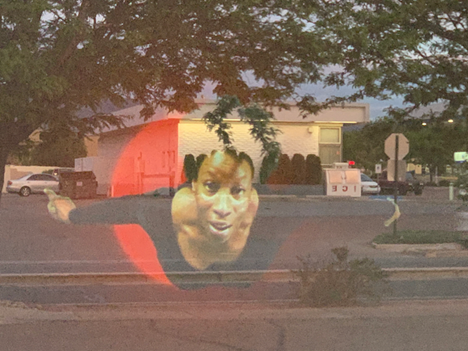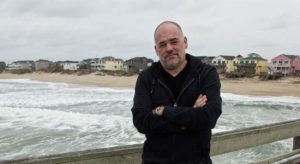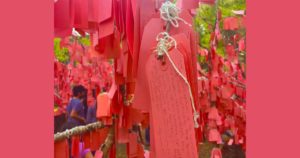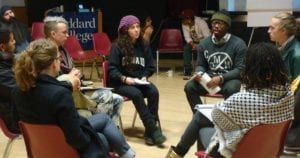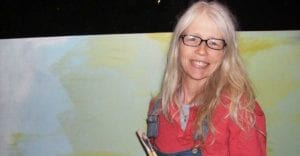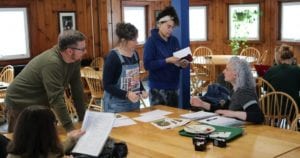 Dear Young Disabled Writer and Disabled Writers Not Yet Born,
Dear Young Disabled Writer and Disabled Writers Not Yet Born,
You might ask: What does this have to do with the disturbing results of the recent U.S. election? Why is this story important for me to impart to you at this time?
When I was born in 1960 nobody knew whether I would live or die. When, after four weeks in an incubator, my parents were able to take me home, nobody knew whether I’d be able to walk.
Now, here I am fifty-six years later, alive and, most of the time, still walking.
You might ask: What does this have to do with the disturbing results of the recent U.S. election? Why is this story important for me to impart to you at this time?
Living with a disability, as you know, often might seem precarious, insecure. All bodies change. We rarely know how these changes will manifest. If there’s anything a life with a disability teaches it is that there is nothing more constant than change. And often with change, it is difficult to assess what, if anything, we can or cannot control.
If in the sentences I just wrote we change “disability” to “the current political solution” perhaps the reason for starting this letter with the story of my birth will be clear, or clearer: Living with the current political situation, as you know, often might seem precarious, insecure. . . . If there’s anything the current political situation teaches it is there is nothing more constant than change.
Over the next years (and I hope it is only years) though material things many of us depend on for survival might disappear or be more difficult to acquire, our lives thus far have prepared us, whether we know it or not, for the time ahead. Living with a disability, imprints upon us the ability to adapt to change.
And as disability historian Paul K. Longmore has written, ““whereas the society-at-large prizes self-sufficiency, independence, functional separateness, and physical autonomy, the disability experience puts forth the values of self determination, interdependence, personal connection, and human community.” These values intrinsic to our lives will serve as necessary beacons as we move hesitantly and/or confidently into the (near) future.
This is not to say it will be easy. As those of us who live with disabilities know all too well, we will encounter barriers, seen and unseen, along the way. Sometimes, these barriers will push us back. Sometimes these barriers will make it impossible for us to participate in civic life as much as or in the way we’d like. Sometimes these barriers will seem or will in actuality be impossible to navigate.
But, despite the hardships, despite the feelings of powerlessness, hopelessness, and fear, the disability experience has prepared us to navigate these barriers. Let’s face it: no matter the political situation we’ve always faced these hardships. We’ve always had to figure out how best to navigate systems, be they governmental, familial, bodily, or otherwise, to get not only what we need to survive but also to participate in life as fully as we desire.
Our achievements as disabled people have been great. During the early years of AIDS, people with disabilities helped those fighting for their lives to navigate the byzantine Social Security and medical bureaucracy. It was those with disabilities who were instrumental in writing and passing the Americans with Disabilities Act. It was people with AIDS who provided the crucial protests and actions leading to the life saving medications used today.
Learn as much as you can about these histories not only because these histories are your histories. Learn as much as about these histories because these histories contain some of what we might need to navigate the barriers ahead.
And, when you know these histories, as well as histories of others who have had to face and face down barriers just as formidable, you will not only how much one can achieve individually, but also, more importantly, how much can be achieved by acting together. In other words, there are allies, millions of them, known and unknown, who can and will help us through the time ahead.
When I was born in 1960, my parents were unequipped to raise a disabled child. At times it wasn’t easy, and sometimes the cost, both financial and otherwise, was costly. Mistakes were made. But, here I am, over fifty-six years later, with a thriving, if sometimes difficult, life. I know I could not be here to write this without my parents, my husband, my friends, as well as the other writers and artists who have given me support and sustenance over the years.
When I started writing, it was difficult to find disabled writers who were role models. But I found them, sometimes in unexpected guises. Today, it is my greatest challenge and joy to be that role model I had so much difficulty finding decades ago.
Honestly, the past months have not been easy. Honestly, I don’t think the time ahead will be easy. Honestly, sometimes my life, whether because of my disability or not, hasn’t been easy.
As poet Louise Glück said in a speech many years ago, she was not only writing for readers today but for readers who are not yet born. It is this I try to keep in mind.
In the time ahead, use your histories, find your role models, and always remember, what we do today is not only for those today, but for those who are not yet born.
Please let me know how things go. I’ll be here moving forward, and listening,
Kenny Fries
This is the letter I wrote when asked by Sabrina Chapp to contribute to the Letters to the Revolution project, www.letterstotherevolution.com.
December 19, 2016
Kenny Fries’s In the Province of the Gods, recipient of the Creative Capital grant in innovative literature, will be published in Fall 2017. He is the author of The History of My Shoes and the Evolution of Darwin’s Theory (Outstanding Book Award, Gustavus Myers Center for the Study of Bigotry and Human Rights), and Body, Remember: A Memoir, as well as editor of Staring Back: The Disability Experience from the Inside Out. He was commissioned by Houston Grand Opera to write the libretto for The Memory Stone. His books of poems include Anesthesia and Desert Walking. He teaches in the MFA in Creative Writing Program at Goddard College. www.kennyfries.com.
Photo credit: Michael R. Dekker

